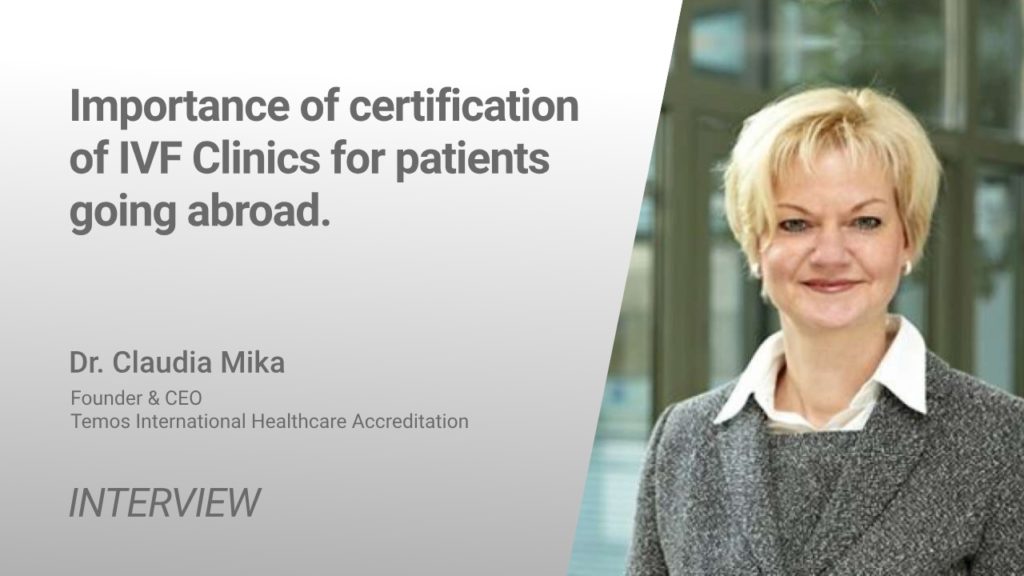Dr. Claudia Mika is the Founder and CEO of Temos International Healthcare Accreditation, a German-based international accreditation body. Using many years of experience, Dr. Mika is developing and improving the Temos accreditation programs, assessing hospitals, clinics, rehabilitation centers, reproductive care centers, and dental clinics worldwide. She has worked globally with healthcare providers and she has the first-hand experience in building quality management systems as well as international patient departments from Brazil to the Philippines. We have interviewed Dr. Mika on certification of IVF clinics.
How important is, from the point of view of the patient, the accreditation of the IVF clinic in terms of international patient service and customer service?
It should be very important! While many patients do not know about accreditation, they do feel the impact of it as part of their patient experience.
Accreditation aims to improve the system, processes, services, and more, e.g. to reduce waiting times or to increase success rates. All patients, domestic and international patients, recognize patient-centered care. During our patient interviews, we often hear that our accredited clinics exceeded patients’ expectations. Often we hear, “I did not know about the accreditation but I experience it and I will tell others that this clinic is accredited according to international standards”.
[button linking=”new_window” link=”https://www.myivfanswers.com/video/quality-standards-ivf-clinics/” align=”center” size=”medium” type=”standard” style=”solid” icon=”” title=”Register now!”]Watch the webinar “How to check the quality standards of IVF clinics”[/button]
What is the difference between certification and accreditation?
What an excellent question. There is a great deal of confusion about the difference between the two because there are no universally accepted definitions of these terms. The key to understanding it to look beyond the label itself. It is more important to understand the process the accrediting or certifying body does than to simply accept one term or another.
Accreditation is a formal process by which a recognized body assesses and recognizes that a healthcare organization meets applicable pre-determined and published standards. Accreditation standards are usually regarded as optimal and achievable and are designed to encourage continuous improvement efforts. An accreditation decision is made following a periodic onsite evaluation by a team of peer reviewers, typically conducted every two to three years. Accreditation is often a voluntary process in which organizations choose to participate, rather than required by law and regulation. Temos International Healthcare Accreditation is an example of this.
Certification is a process by which an authorized body evaluates and recognizes either an individual or an organization as meeting pre-determined requirements or criteria. Although the terms accreditation and certification are often used interchangeably, accreditation usually applies only to organizations, while certification may apply to both individuals or organizations.
When applied to individual practitioners, certification usually implies that the individual has received additional education and training, and demonstrated competence in a specialty area beyond the minimum requirements set for licensure. An example of such a certification process is a physician who receives certification by a professional specialty board in the practice of obstetrics. When applied to an organization, or part of an organization, such as the laboratory, certification usually implies that the organization has additional services, technology, or capacity beyond those found in similar organizations.
As a patient, what should I ask the clinic before I choose one?
Patients should do their own research carefully and be willing to ask questions or request additional information. Communication with the clinic is an essential part of healthcare services. Some questions include: Is there a user-friendly and well-constructed website that is easy to use and offers key information? Does it contain transparent information about the services offered and costs? Are testimonials published? How are the activities in social media? Are the vision and mission of the clinic are clearly stated? Is there an opportunity to talk with someone including the doctor? Are questions answered fully and clearly?
- Overall, ask yourself, “Do I feel well-informed and in good hands by the presentation and information provided?”
- Ask the clinic if there is a contact person for all questions and check how long it takes to get a response.
- Ask for the treatment plan and cost estimates as well as which services are available before, during and after the treatment abroad.
- Ask about the qualifications of the professionals. Do the doctors and embryologists have the right qualifications and experience for my/our needs? Are qualifications and experience of professionals approved, e.g. by certification (please see question before).
- Ask about the technical infrastructure. Is there information available about the equipment used? About cleanroom standards, laboratory air quality control and restricted access?
- Does the clinic clearly and simply explain its success rates?
- And of course, ask if there is an international accreditation for the clinic that involves an onsite independent third-party assessment.
What patients should pay attention to when they are at the clinic?
In addition to the questions suggested, in these times of COVID-19, ask about the measures of infection prevention, (hand) hygiene and cleaning.
Are you informed about the needed measures to minimize the risk of transmission? Is information displayed and/or provided through a brochure or leaflet?
Another important point is the availability of information and the documentation of the treatment plan including a signed consent form which summarizes the goals, risks and any other applicable information.
Does a proper certification/accreditation automatically mean the high quality of a clinic?
Yes! If we define “proper accreditation” as a continuous improvement process including a self-assessment and external peer assessment to determine the level of performance in relation to established standards.
Besides the increase of effectiveness, patient and staff safety, saving money and other added values the aim of accreditation is to assure high quality from the first contact with the patient until the patient has completed the treatment.
Hundreds of standards help the clinic to achieve these goals, to assure that documentation is complete, patients are informed about their treatment options but also rights and duties, that treatment and laboratory work is performed under highest hygienic conditions, that the staff has the required qualification, etc.
Accreditation also means to assure “the best possible patient experience”.
Can information be certified or accredited? For example, information on success rates that clinics display on their websites? Some clinics say that their statistics have been confirmed by an independent organization.
Statistics isolated as numbers and figures without context cannot be certified and this approach is questionable and dangerous.
What we and other serious accreditation bodies do is to ask for evidence confirming that our standards have been implemented and are followed. We ask for so-called outcome parameters or “Key Performance Indicators” (KPIs), parameters that are defined, measured, analyzed, and monitored on a regular basis. Appropriate measures, adjustments to or changes of outcome parameters as well as corrective actions must be in place.
[button linking=”new_window” link=”https://www.myivfanswers.com/video/quality-standards-ivf-clinics/” align=”center” size=”medium” type=”standard” style=”solid” icon=”” title=”Register now!”]Watch the webinar “How to check the quality standards of IVF clinics”[/button]
Taking the example of published “success rates”, the clinic should clearly explain the basis for the statistics. Are the results differentiated by the age of the woman undergoing treatment? Is the cause of infertility considered? What means “success”? Is it the live birth rate or the biochemical pregnancy rate or the clinical pregnancy rate? Is it per embryo transfer, per frozen embryo transfer or per multiple embryo transfer? Apples must be compared with apples and not with oranges.
Clinics that work ethically and deliver a high level of quality do transparently and are willing to explain the meaning of their statistics. As the accreditation body, we accredit those KPIs as part of the overall accreditation program. For reproductive health providers, those accreditation programs consist of 400 to 500 standards that we review thoroughly so that patients can rely on them.
Is ISO 9001 certification important from the point of view of a patient? Nowadays most clinics have ISO 9001.
ISO 9001 can be a good basis for the implementation of a quality management system; however, patients should know that the standards of the ISO 9001 certification program are not specific for hospitals and clinics. Those certification standards can be used and implemented by any organization, the grocery around the corner, gyms, car repair shops, and also clinics.
Thousands of companies worldwide offer ISO 9001 certification. The quality of those companies varies from excellent customer support including well-trained auditors to no service at all and only selling the certificate. Unfortunately, it is quite difficult for patients to find out about the quality of the ISO 9001 certification of a clinic. The ISO 9001 certificate should not be the only basis for decision-making.
Table of Contents
- 1 How important is, from the point of view of the patient, the accreditation of the IVF clinic in terms of international patient service and customer service?
- 2 What is the difference between certification and accreditation?
- 3 As a patient, what should I ask the clinic before I choose one?
- 4 What patients should pay attention to when they are at the clinic?
- 5 Does a proper certification/accreditation automatically mean the high quality of a clinic?
- 6 Can information be certified or accredited? For example, information on success rates that clinics display on their websites? Some clinics say that their statistics have been confirmed by an independent organization.
- 7 Is ISO 9001 certification important from the point of view of a patient? Nowadays most clinics have ISO 9001.





